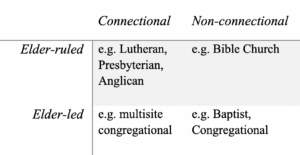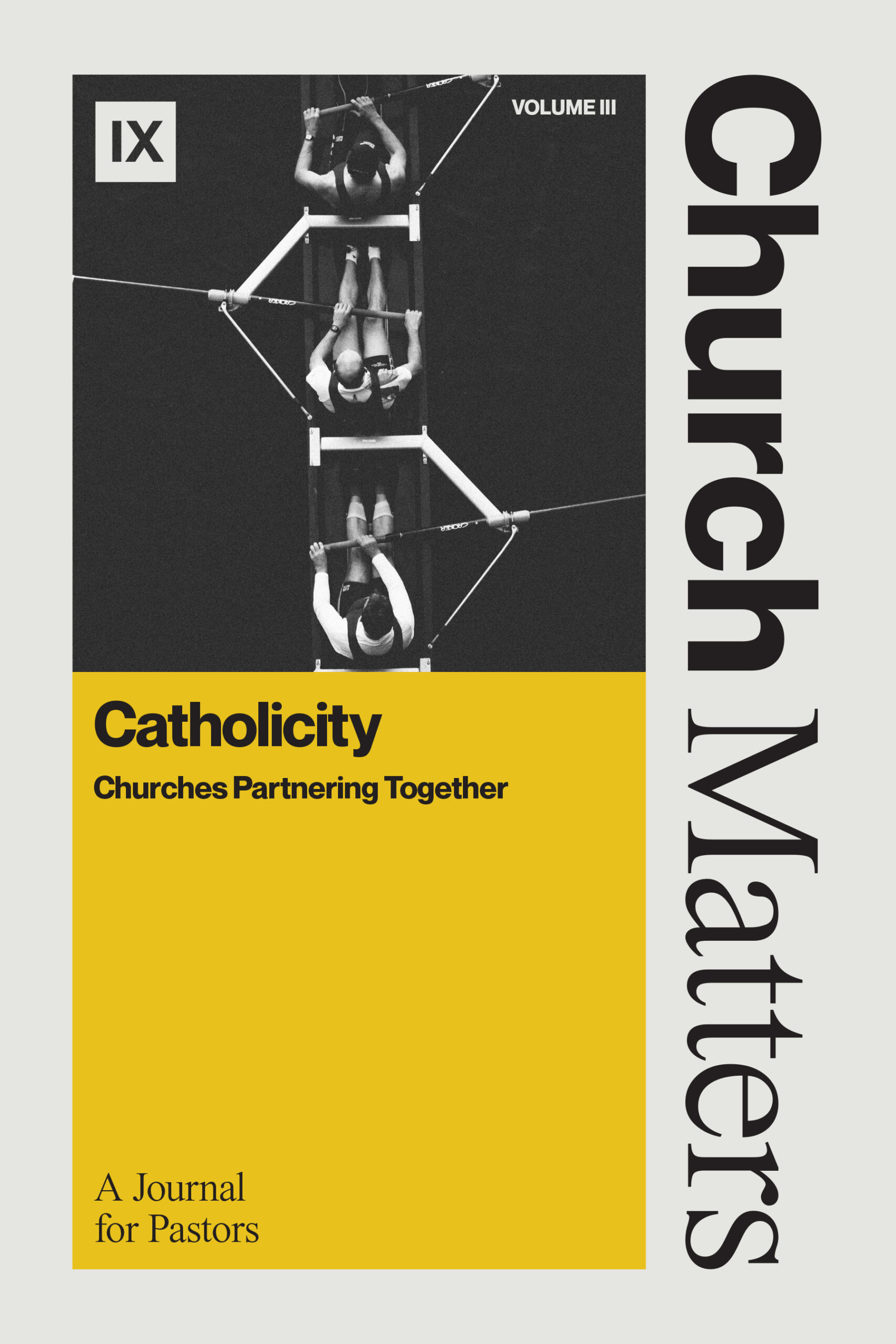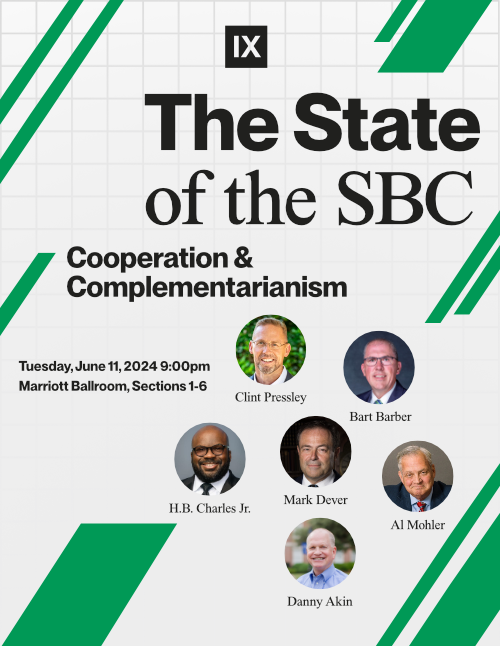Are Ecclesiological Convictions and Catholic Affirmations Mutually Exclusive?
“Your church’s practice is anti-catholic!”
A friend or two has made this charge against Baptist churches like mine for requiring people to be baptized as believers before joining. Like most churches of every denomination, we require baptism before admission to membership. The challenge is, paedobaptists of every kind define their sprinkling as infants as a “baptism,” whereas we do not. Therefore, we say to anyone sprinkled as an infant, “You must be baptized to join.” And that feels anti-catholic to some.
What does it mean to charge a church with anti-catholicity? It means that, while a church may confess in the words of the Nicaean creed that it believes in the catholic or universal church, the church’s actual practice of barring some Christians from membership undermines that profession. That’s what these friends say my church is doing. Insofar as the doctrines of catholicity and unity stand in obverse relation to one another—catholicity says the one are many; unity that the many are one—to charge a church with anti-catholicity is to charge it in the same breath with being divisive or anti-oneness.
To put the shoe on the other foot, I remember the first time I visited a (Missouri Synod) Lutheran church. The bulletin in my hands told me that I could receive the Supper only if I shared the church’s view of the Supper—consubstantiation. The Supper, say the Synod’s official documents, is for those with “genuine faith”; and genuine faith “includes a proper understanding of and faith in what the Sacrament is, that is, in the doctrine of the real presence of Christ’s body and blood in and under the sacramental elements of bread and wine.”[1] By practicing what they call “close communion”—which is a middle ground in between “open” and “closed” (see conclusion below)—the church forbade me from participating in the Supper.[2]
Therefore, I didn’t take the Supper that Sunday. You might think that I should have protested, “But I’m a Christian! And you’re being anti-catholic!” Of course, I can’t say that, at least not consistently, because my church practices close communion, too, albeit according to our convictions concerning baptism.
Taking the Charge of Anti-Catholicity Seriously
The anti-catholicity (or, obversely, anti-unity) charge is worth taking seriously. So let me back up and summarize what catholicity is and what it requires (see my article on these two questions here):
- What the doctrine of catholicity is: King Jesus is gathering to himself a people from every tribe, tongue, and nation through his new covenant. This new covenant people, the church, is therefore a global and multifarious people, as expressed increasingly with and inside of every local congregation.
- What the doctrine requires: individual churches should recognize and partner with other gospel-preaching churches around the world in a manner appropriate to the Bible’s institutional mandates for churches.
With this in mind, you can understand why Christian friends might charge churches like mine with being anti-catholic. The doctrine obligates a church to recognize other gospel-preaching churches as true churches, and that implies we recognize the members of other churches as true Christians.
Furthermore, what are the Bible’s most concrete mechanisms for formally recognizing a Christian or member of the new covenant? The signs of the covenant—baptism and the Lord’s Supper. Therefore, to deny people admission to your church and Table fellowship based on ecclesiological differences—the argument goes—is to functionally deny they are members of the new covenant, or Christians.
It’s like a preemptive excommunication. You may genuinely believe in your heart that the individuals you’re barring from membership and the Supper are believers, but your actions speak otherwise. And that’s anti-catholic because it treats churches with your convictions about the ordinances alone as true, Supper-worthy churches. By the same token, it feels divisive or anti-oneness, as I said.
In all this, I take it as a foregone conclusion that Christians possess a certain kind of obligation to recognize other Christians as Christians. We shouldn’t do what Joseph’s brothers did to him—pretend we don’t know the guy and sell him to the Ishmaelites. Instead, think of Peter at Cornelius’s house. He witnessed the Spirit coming upon the Gentiles, hearing them “speaking in tongues and extolling God.” Peter then declares, “Can anyone withhold water for baptizing these people, who have received the Holy Spirit just as we have?” (Acts 10:47). The apostle, in other words, seemed to think he didn’t have the right or the authority to withhold the recognizing-rite of baptism from individuals who gave evidence of regeneration. He felt conscience-bound to recognize through baptism what God had done.
Furthermore, operating quietly inside of the anti-catholicity charge is the prioritizing of doctrine—of gospel doctrine over church doctrine. Which makes some sense. Some doctrines are more important than others. Most important of all are those doctrines upon which salvation depends, like the gospel. Meanwhile, our beliefs about the ordinances are important, but not as important as the gospel, since salvation does not depend on getting the ordinances right. Think of the thief on the cross who was never baptized, yet to whom Jesus promised paradise.
Often, we use the language of “theological triage” to capture these priorities. Doctrines that are necessary for salvation we call first-tier. Doctrines that are necessary for organizing a church we call second-tier. Another way to summarize the anti-catholic (and an anti-oneness) charge is, “You’re prioritizing second-tier matters over first-tier matters. That’s upside-down and out of step with the gospel!”
In fact, I believe the charge of anti-catholicity, when used to critique ecclesial convictions, evinces an inadequate understanding of catholicity. Beyond that, it wrongly pits one obedience against another. It relativizes and individualizes Christ’s ecclesial commands. And it pits the gospel against the very thing Christ has given us to protect the gospel, church order, which severs faith from deeds. Let me start with those latter three critiques, and then return to how we should understand catholicity.
Problem 1: Pitting Obediences Against One Another
Contrary to the critics, the question at stake when a paedobaptist asks to join a Baptist church or a Baptist asks for the Supper at a Lutheran church is not about affirming second-tier doctrines over first-tier. Rather, it’s about looking at two sets of commands or obligations and asking which of the two we will obey:
- the obligation to recognize believers as believers, like Peter calling for the baptism of the Gentiles;
- and the obligation to obey what the Bible says about church order, a term I’ll use in the remainder of this essay to incorporate both church government and the practice of the ordinances.
Those who charge Baptist or Lutheran churches with being anti-catholic stress the obligation of gospel recognition. Yet in doing so, they ask people like me to compromise our convictions about the obligations of church order. They pit one set of obligations against another.
I believe we need to fulfill the obligations of both gospel recognition and church order. None of us have the authority to say, “You can obey these commands and not those.” We should not treat our ecclesiological convictions and catholic affirmations as mutually exclusive. After all. . .
Problem 2: Relativizing or Individualizing Our Convictions about Church Order
Pitting catholic affirmations against ecclesiological convictions risks relativizing or individualizing all second-tier doctrines. It effectively says, “You can believe what you want about second-tier doctrines, but any time someone wants to join your church or take the Supper who disagrees with your second-tier doctrines, you have to set aside those convictions, at least as a matter on which your church collectively stands.”
To follow this logic all the way, we would need to abandon the very existence of Presbyterian churches, Lutheran churches, Baptist churches, and so forth. We could only have “Christian” churches, where the ordinances are treated in an entirely individualistic fashion. Hold onto those beliefs in your heart and practice them for yourself, but that’s all you can do.
I understand that this is exactly what some Christian voices recommend. But. . .
Problem 3: Severing Faith and Deeds in Our Corporate Life Together
A third problem follows the second: the severing of faith and deeds in our corporate life together. The Bible calls Christians to respond to the gospel both inwardly in faith and outwardly in baptism. “What must we do to be saved?” the crowd asked Peter? “Repent and be baptized,” he replied (Acts 2:37, 38). Elsewhere he refers to the “baptism which saves you” (1 Peter 3:21). Peter used the external symbol of baptism to represent our inward conversion to Christ.
God calls us to respond to his gospel inwardly in faith and outwardly in deeds. What is church order? It’s the corporate part of our obligatory outward deeds.
To put it another way, church order is the social ethics of the gospel. We’re commanded to be baptized (Acts 2:38). We’re commanded to take the Lord’s Supper while “discerning the body” and “waiting for one another” (1 Cor. 11:27, 33). We’re commanded to gather and to bind one another by agreeing in Jesus’s name (Matt. 18:18-20). We’re commanded to loose or remove unrepentant sinners (Matt. 18:17; 1 Cor. 5:2, 5, 12). We’re commanded to only install elders who are above reproach (1 Tim. 3:2). And so forth.
To relativize and individualize these commands, therefore, is to relativize and individualize God’s public presentation and social embodiment of the gospel. And, again, it severs faith and deeds in our corporate life together.
Our deeds don’t save us, of course, but they are the sign and proof of our faith. It’s easy to turn this into a flow chart: faith creates deeds, and deeds display, prove, and protect faith. Like this:
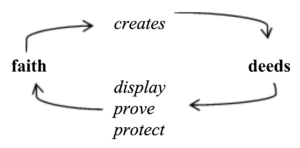
So it is with the gospel and an ordered church, like this:
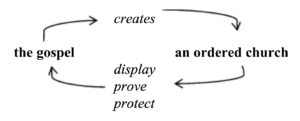
Do you want to display the gospel? Then pay attention to your practices of membership and discipline, baptism and the Supper. Do you want to protect the gospel from one generation to the next? Then make sure you’re following what the Bible prescribes for church government.
How short-termed, then, is any “gospel essentialism” that sloughs off church order. Get rid of church order in one generation, and you’ll lose the gospel in the next.
It's true that first-order doctrines are essential for salvation in a way that second-order doctrines are not. But second-order doctrines are essential for obedience to the gospel—for living it and preserving it.
One United Methodist minister, responding to a news cycle over whether or not pro-choice politicians like Joe Biden should receive communion, has written, “Deciding who deserves to receive communion is beyond the job description of the church.” He offers, “This means the church does not get to refuse anyone the privilege of participating in God’s gift. We did not create communion. We, therefore, do not get to limit Communion.” After all, “The church is a recipient of grace. We do not own grace. We do not restrict grace.”[3]
Notice what his appeal to grace does: bulldozes over the authority of the church, thereby compromising the substance and shape of the church as a marked off and holy people. In the name of grace, he is promoting a corporate antinomianism, and so individualism, and so relativism. He is severing faith from deeds.
Much better than this Methodist author are the Lutheran (MS) documents. Justifying their right to withhold the Supper when someone does not hold to consubstantiation, the Lutherans remark, “Christians are not to be seen merely as ‘individuals’ but also as ‘confessors’ of the doctrine of their own church body.”[4]
This is difficult to accomplish in “a time of rampant individualism when people ‘do their own thing’ even when joining a church.” Yet failing to treat Christians as confessors of a church’s doctrine risks at least three dangers:
In the first place, the current erosion of the importance of doctrine would be accelerated to an alarming extent. . . In the second place, if the doctrinal confession of one’s own church body can be ignored, then it must follow that heterodoxy poses no danger to the spiritual lives of Christians. . . In the third place, if individual church members are not seen as “confessors” of their church body’s doctrine, then the concept of church membership is watered down to the point of meaninglessness. . .[5]
I do not hold to consubstantiation, nor does my church restrict guests with different convictions about the Supper. We put up a fence in a slightly different place. But I utterly affirm the Lutherans’ right to fence the Table according to their biblical convictions, even when it excludes me from the Supper. I can complain, or I can merely join a church that agrees with my convictions while partnering with the Lutherans in other ways. We’re still gospel neighbors living on the same street. Which brings us back to catholicity.
The Significance of the Bible’s Institutional Specifics
Let’s stop and summarize the territory we’ve covered so far. Christians sometimes accuse one another of being “anti-catholic” or “anti-oneness” when disagreements on second-order issues impact our ability to share fellowship at the Lord’s Table or in church membership. The assumption is second-order convictions should never inhibit first-order agreement when it comes to membership or the Supper. Any self-professing Christian should be able to join or indefinitely celebrate the Supper at your church, even if they disagree with your church about what the Supper and baptism means, or who can receive it. I’ve responded by saying, this assumption threatens people’s ability to follow their convictions over church order, which belongs to the category of obedience and social ethics; and this is problematic in the three ways I described above.
Nonetheless, it remains the case that good gospel believers sincerely disagree about church order. That’s reality. Should we therefore insist that they simply belong to different churches, and is it possible to understand both catholicity and oneness in a manner that allows for this? The short answers are, yes and yes.
What’s crucial in discussing the doctrines of catholicity and unity is to never pit them against what the Bible teaches about ecclesiology. Rather, we should formulate our doctrines of catholicity and unity by working through what the Bible says about the church’s institutional specifics.
For instance, if the Bible does indeed establish a planet-sized episcopal structure, like the church of Rome teaches, then our doctrines of catholicity and unity should require churches to submit to this structure. If, however, the Bible establishes a congregational framework for our churches, then our doctrinal formulations for catholicity and unity will not involve this kind of institutional submission. Instead, those formulations will envision non-institutional or less formal renditions of both doctrines. All this is why I have defined the requirement of catholicity above as the obligation on churches to recognize and partner with one another in a manner appropriate to the Bible’s institutional mandates for churches.
This means, our beliefs about church government will impact our doctrines of unity and catholicity. And here, two divides are crucial.
First, there is a divide between connectionalism and non-connectionalism. Connectionalists believe formal structures connect churches, whether those structures are presbyterian or episcopalian. Non-connectionalists don’t. They believe churches are free or independent of one another’s formal authority.
Second, there is a divide between elder-ruled (non-congregational) and elder-led (congregational). Elder-ruled churches believe the elders have final authority in matters of membership, discipline, and doctrine. Elder-led churches believe the congregation holds this final authority, though congregations should generally follow the leadership of the elders. A graph might look like this:
Churches in all four quadrants can adopt positions on membership and the Supper that approximate one another.[6]
Still, these institutional differences will show themselves one way or another when it comes to understanding catholicity.
That divide between elder-ruled and elder-led, for instance, allows elder-ruled churches to require a broader set of doctrinal affirmations among the pastors or elders and a narrower set among the membership. In the Presbyterian Church of America, for instance, members must answer five questions which acknowledge their sin, the necessity of trust in Christ for salvation, the pledge to follow Christ, the promise to support the work of the church, and the promise to submit to the government and discipline of the church.[7] Elders, meanwhile, must affirm the entire Westminster Confession of Faith.
I have two problems with requiring one doctrinal statement of the elders and another of the members. First, speaking as a congregationalist, it defrocks the saints. Christ makes us all priests. But when you give the elders final authority in membership, discipline, and doctrine, you effectively fire the saints and turn the elders into a priestly class.
Just consider: what did the OT priests do? Among other things, they declared people holy, clean, and able to enter the camp. Likewise: who has the authority to declare a person a member in a church? However you answer that question, there’s your priestly class. In any religion, the priests are those individuals responsible for admission and for doctrine.
Second, leaving my congregationalism to the side, the Lutherans are right: by treating Christians as individuals and not as confessors of the church’s doctrine, we downplay the significance of doctrine and weaken every Christian’s commitment to it. We say to the saints, “Don’t worry about the doctrine. It’s not so important that you understand and agree. The experts will take care of things. Sit back and relax.” It’s hard for members to avoid concluding, “I guess these convictions are not so important after all.”
Better Understanding the Demands of Catholicity
For my part, I don’t believe the Bible establishes a formal connection or institutional structure between churches. If you and I disagree on that, we can, maybe, hash it out another day.
In the meantime, we can agree, hopefully, that Scripture provides other, less formal ways for churches to recognize and partner with one another. And if that’s the case, by logical necessity, there must be other, less formal ways for Christians to recognize and partner with one another—that is, apart from membership in a church and the sharing of the Supper.
Nowhere, for instance, do we see members of different churches celebrating the Lord’s Supper together, but different churches do share love and greetings by letter (Rom. 16:16; 1 Cor. 16:9; 2 Cor. 13:13, Eph. 1:15; 4:22; Col. 1:4).
Nowhere do we see an elder or overseer exercising authority over multiple congregations (at least without the presence of the apostles and the unique revelatory presence of the Holy Spirit, e.g. Acts 15:28), yet they do share preachers and missionaries (2 Cor. 8:18; 3 John 5-6a).
Nowhere does a denomination own a church’s property, but churches do support one another financially with joy and thanksgiving (Acts 15:25-26; 2 Cor. 9:12; also, 2 Cor. 8:1-2).
Nowhere do denominational authorities or synods determine ethical stances, say, on marriage and sexuality, but the churches do imitate one another in Christian living (1 Thes. 1:7; 2:14; 2 Thes. 1:4).
Nowhere does a bishop remove a pastor, but churches do caution one another about whom to receive as teachers (1 John 4:1; 2 John 7-8a).
Through the apostles’ pens, churches recognize and affirm their partnership with one another in the final chapter of nearly every letter. Never is that work obviously formalized, but it’s vibrant and active nonetheless.
In short, members of every Christian tradition should be able to agree that (a) Christians recognize and affirm one another formally through the ordinances inside the fellowship of a single church. And members of every tradition should agree that (b) churches and the Christians who comprise them recognize and affirm one another informally in a variety of ways across churches. The only point of disagreement lies in the centuries’ old question of connectionalism and whether (c) churches must recognize one another formally through a bishop or presbytery.
Still, assuming we can all agree on (a) and (b), consider what this means for our doctrines of both catholicity and unity, no matter our tradition: we all have biblically informed ways of informally recognizing other Christians and churches, even when we do not agree on second-order matters.
Therefore, when the Presbyterian seeks to join a Baptist church, or a Baptist seeks to take the Supper at the Lutheran church, we have two options for how to proceed in view of catholicity, assuming we’re leaving conversations about (c) for another day:
Option one is to argue that catholicity requires us to individualize and relativize all our second-tier differences, pitting catholic affirmations against ecclesial convictions. We tell people they’re free to have convictions concerning church order, but those convictions cannot define our churches. One person can be baptized as he sees fit, another person as she sees fit, or perhaps neither need to be baptized at all. Church order depends entirely on a person’s own conscience. What then makes a church a church, or members members? It cannot be the ordinances since those will be individualized.
Option two is to argue that catholicity (i) is a characteristic primarily of churches and (ii) is demonstrated informally through a church’s actual partnership and activity with other churches.
Option two treats catholicity as a property primarily of churches, and only derivatively of the members in those churches. Meaning, it imposes its demands on a church acting corporately externally toward other churches, not internally toward one’s own members, where it still insists on agreement over second-tier issues, lest we sever faith and obedience.
So, for starters, such a church is willing to recognize in various informal ways the legitimacy of other gospel-preaching churches, even if it disagrees with how those other churches construe the ordinances. For instance, I would say it was anti-catholic of Baptist churches in the nineteenth century to refer to Presbyterian churches not as churches, but as “religious assemblies.” They formally de-churched those churches. They would have done better to acknowledge that those churches are indeed churches, but then argued for why they believed those other churches are in error over their view of the ordinances. They could have called them disorderly or irregular churches, but true churches nonetheless.
Yet, frankly, more important than the names or labels we place on things is how a church acts altogether and undertakes its mission. Does a church pursue its mission by itself, relying entirely on its own resources? Or does it undertake this work in partnership with other churches, giving and receiving resources? Does it undertake evangelism, missions, pastor-training, and anything else we might place into the church’s mission with other churches? Is it generous with its resources toward other churches? Or does it go it alone? That is where you will see a church’s catholicity or lack thereof.
Pastors can call themselves catholic because they attend presbytery, take directions from the synod, or let anyone who calls himself a Christian take the Supper in their church. I’m far more interested in whether the congregation’s corporate activity resembles the sort of thing we see among the apostolically-directed churches of the New Testament. Does the church do things like:
- pray for other churches by name most Sundays;
- invite the pastors of other churches to share about their needs in our prayer service;
- partner with other churches in evangelism and hosting conferences;
- partner with other churches in missions, church planting, and seminary education;
- donate overages in the church budget to other churches or take up offerings for other churches;
- list good nearby churches on the church website;
- list good nearby churches on a brochure placed by the church building entrance;
- encourage prospective church members to visit the good church much closer to their home;
- speak well of other churches;
- sponsor and hosts pastoral fellowship for other pastors in the city;
- offer supply preachers to other churches in need;
- receive pastoral interns from other churches and then send them back
Moreover, while some of these bullets apply only to churches who share the same convictions about church order (e.g. partnering for missions and church planting), other bullet points should apply across denominations and traditions (e.g. partnering in evangelism, prayer, and giving).
In short, I’m less interested in views on catholicity by arm-chair theologians who like bumper stickers. I’m more interested in pastors and churches who are working to fulfill the Great Commission and doing so in a non-turfy way, recognizing that we’re all playing for the same kingdom team.
Conceding the “Not Yet”; Showing Charity
A right view of catholicity—option two above—must concede to the “not yet” nature of our salvation and eschatology. It doesn’t demand complete institutional agreement between all churches on earth today, which depends on an over-realized eschatology. Rather, it acknowledges that some disagreements remain between us, but that we can still find ways to affirm our ongoing fellowship amidst those disagreements. Option two lets baptistic churches be baptistic churches, and paedobaptistic churches be paedobaptistic churches, but it insists that both find ways to declare the gospel together, share conferences together, publish books together, cooperate and agree and do ministry in all the ways we can based on the first-tier doctrines that unite us.
Option two requires both charity and maturity. It requires the charity of overlooking another church’s errors and saying to them, “Even though we think your church is wrong and disorderly in how it understands the ordinances, that’s easy to overlook because what we share in the gospel is so much more precious. Therefore, we want to find ways to fellowship and work with you in ways that respect our differences.” It requires maturity to hear someone say those things to you, forswear offence or resentment over the charge of error, and then receive the overtures of gospel partnership. And, to be clear, both sides or any given difference requires both charity and maturity.
A Last Word on Fencing the Table: Not Open or Closed but Close
How then should a church “fence” the Table? There are three basic options:
- “Closed” communion opens the Table only to one’s own members. I count this as a functional denial of the catholic or universal church.
- “Open” communion opens the Table to everyone calling themselves a Christian. I believe this leaves the Table unguarded and works against the church’s apostolicity or doctrinal faithfulness (a conversation for another day!).
- “Close” communion opens the Table to one’s own members as well as baptized members in good-standing of other gospel-preaching churches. This, I believe, satisfies the demands of both catholicity and apostolicity.
Like the Lutherans, my church chooses close communion, though we draw lines a little differently. So if you’re visiting Cheverly Baptist Church, and you’re a baptized member in good standing of another gospel-preaching church, you’re welcome to take the Supper with us!
* * * * *
[1] In “Admission to the Lord’s Supper: Basics of Biblical and Confessional Teaching,” from A Report of the Commission on Theology and Church Relations of the Lutheran Church—Missouri Synod (November 1999), pp. 34.
[2] “Theology and Practice of the Lord’s Supper” Part I: A Report of the Commission on Theology and Church Relations of the Lutheran Church—Missouri Synod (May 1983).
[3] Tom Fuerst, “Four Things Methodists Believe About Communion,” (June 23, 2021): https://www.ministrymatters.com/reach/entry/10825/four-things-methodists-believe-about-communion.
[4] “Admission to the Lord’s Supper,” 41.
[5] “Admission to the Lord’s Supper,” 44-45.
[6] For instance, churches in all four quadrants can adopt an open, close, or closed position on the Supper, as we’ve seen that both Lutheran and Baptist churches do. Yet within a connectional scheme, the openness that does exist within a “close” position will tend to apply to those within the same denomination. So it is, for instance, with the Missouri Synod Lutherans.
[7] PCA Book of Church Order 57.5: “Do you acknowledge yourself to be a sinner in the sight of God, justly deserving His displeasure, and without hope save in His sovereign mercy? Do you believe in the Lord Jesus Christ as the Son of God, and Savior of sinners, and do you receive and rest upon Him alone for salvation as He is offered in the Gospel? Do you now resolve and promise, in humble reliance upon the grace of the Holy Spirit, that you will endeavor to live as becomes the followers of Christ? Do you promise to support the Church in its worship and work to the best of your ability? Do you submit yourself to the government and discipline of the Church, and promise to study its purity and peace?”
Related Multimedia

How to Use Prayer Meetings to Promote Catholicity
By Ben Lacey



